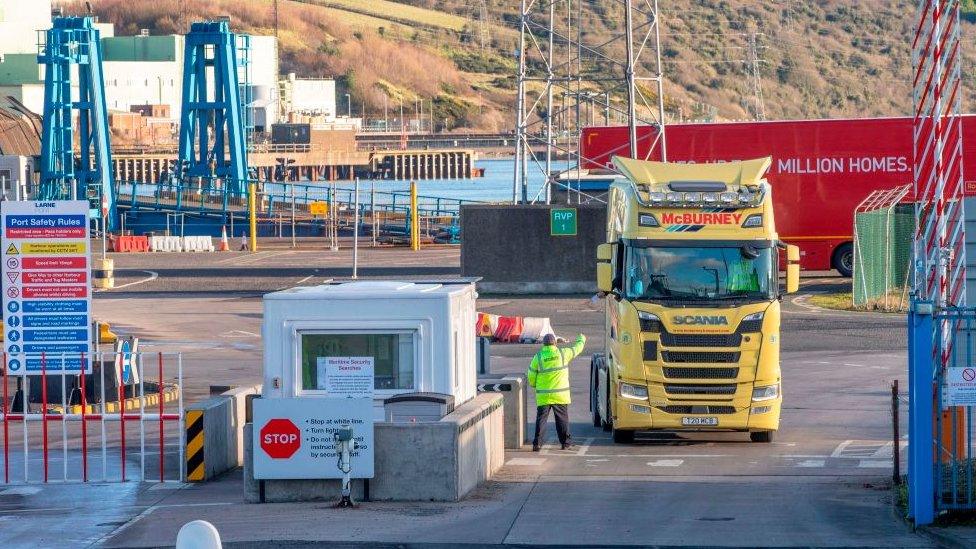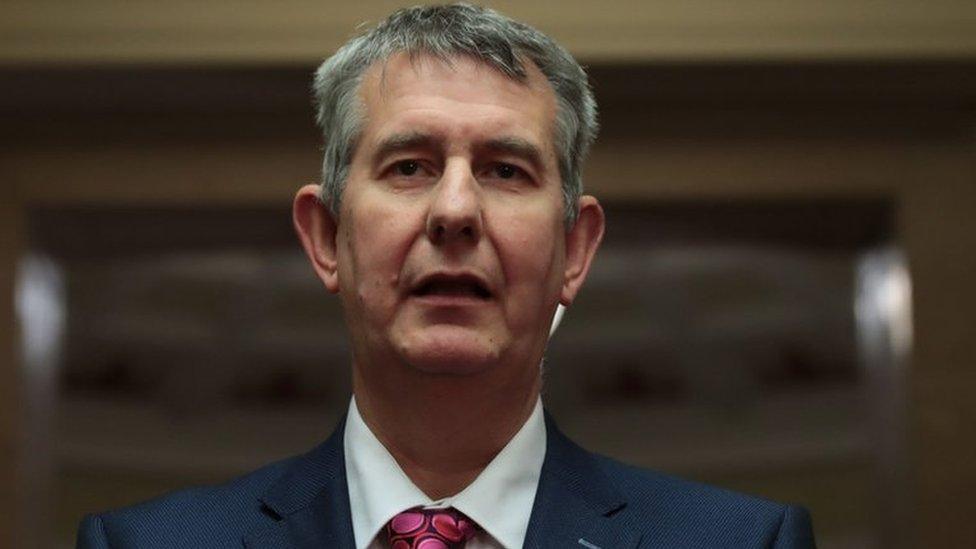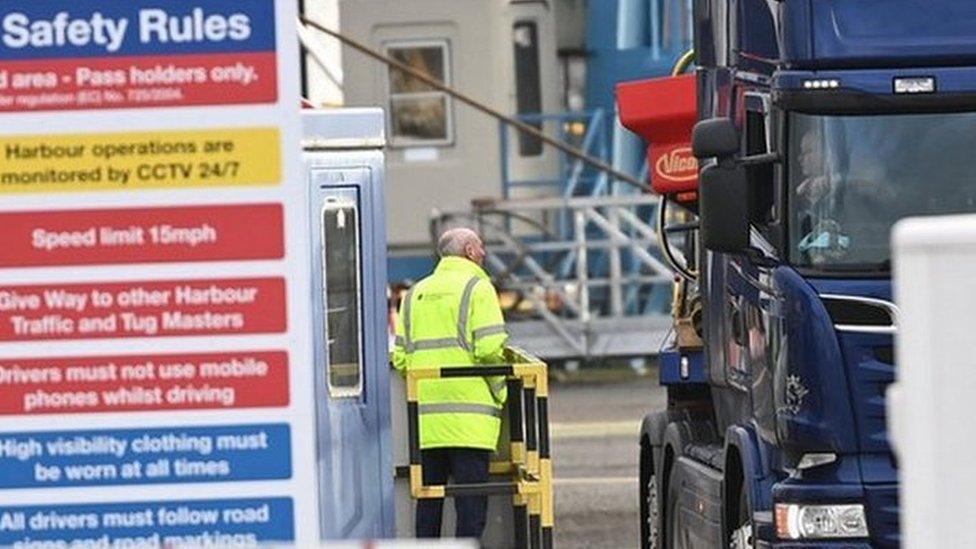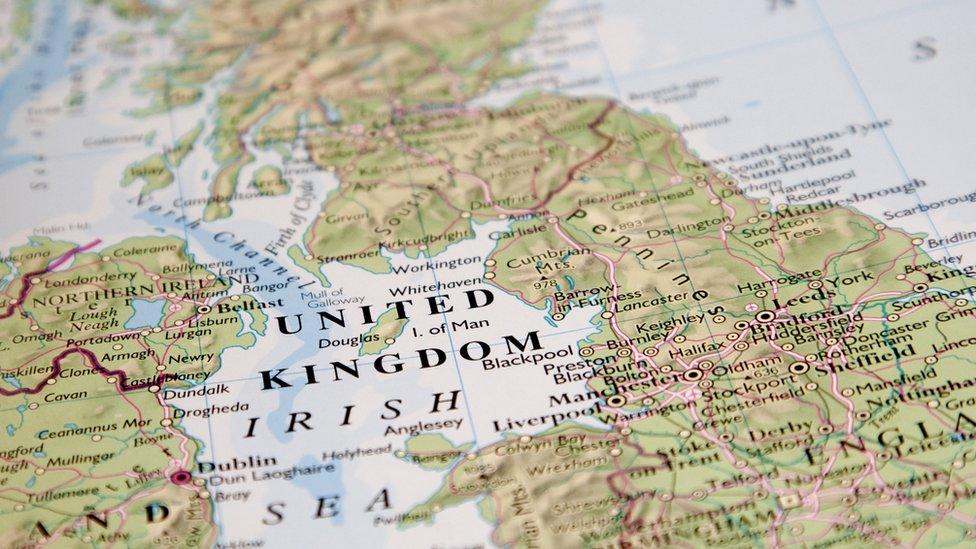Q&A: Irish Sea border checks
- Published

Northern Ireland Agriculture Minister Edwin Poots has ordered checks to be halted on goods along the Irish Sea Border as part of the DUP's ongoing opposition to the Northern Ireland Protocol.
Inspections of products from Great Britain into Northern Ireland are part of the post-Brexit protocol agreement.
It was agreed by the UK and EU to ensure free movement of trade across the Irish border after Brexit.
Under the deal, checks on goods from Great Britain must take place at Northern Ireland's ports to ensure they comply with EU laws.

What checks have been stopped?
It doesn't appear any checks have stopped - yet.
Downing Street says checks are continuing, despite Edwin Poots ordering them to stop - but the situation is still unclear, with some confusion over what will happen next.
Officials in Daera (Department of Agriculture, Environment and Rural Affairs) in high-visibility jackets were operating at Belfast control posts on Thursday.
Northern Ireland's hauliers have been left in limbo by the announcement, with some uncertainty over how they should operate.
However, Mr Poots' directive applies only to animal, food and plant products - it is understood only about 3%, of lorries which arrive at Belfast Port have to open their doors for their goods to be checked.

Why is this happening now?
This is part of the DUP's ongoing campaign against the Northern Ireland Protocol.
The party opposes the protocol and for months it has been threatening to act.
The DUP was waiting to see if progress could be made between the UK and the EU in their negotiations, but have now shifted up a gear.
Their opponents at Stormont say this is an electioneering stunt ahead of May's Assembly elections, but the DUP rejects this.
The DUP's position as the biggest party in the assembly is coming under pressure, with the party potentially losing votes to the more hard-line Traditional Unionist Voice party.
Some say the border checks move is part of a vote-winning strategy showing the party is taking a tough stance on the protocol.

Is the decision legal?
Northern Ireland Agriculture Minister Edwin Poots says he received legal advice from the former Northern Ireland Attorney General John Larkin, who was appointed in 2010 and served for a decade.
Following his departure in 2020, the DUP and Sinn Féin were unable to agree on a replacement and Brenda King was appointed Interim Attorney General until June 2022.

Edwin Poots has ordered checks to be halted on goods along the Irish Sea Border as part of the DUP's ongoing opposition to the NI Protocol
Mr Poots said he was advised that approval for the sanitary and phytosanitary checks at ports had not been obtained from the Northern Ireland Executive - which was needed for them to continue.
In the absence of executive approval, he had the authority to order the stopping of checks.
Ms King's advice, accepted by Sinn Féin, SDLP and the Alliance party, is that the Northern Ireland Protocol is a binding legal commitment, both in domestic and international law.

What will be the impact on the public and businesses?
Businesses in Northern Ireland are looking for stability and certainty.
The Daera checks are just one part of the GB-to-NI trade process, said Aodhán Connolly, director of the NI Retail Consortium, advising businesses to minimise the chance their products get caught up in regulatory or legal problems.
Lorries carrying goods are still advised to have relevant paperwork prepared, even in the eventuality of checks being halted.
Last month, business representatives in Northern Ireland said "practical solutions" must be found to manage the protocol when they held talks with UK Foreign Secretary Liz Truss.

What happens next?
Mr Givan has announced his resignation as Northern Ireland first minister, effective at midnight.
Deputy First Minister Michelle O'Neill will also have to resign.
This is because of Northern Ireland's power-sharing arrangements - the roles of first and deputy first ministers are a joint office shared between the two biggest parties at Stormont.
Neither leader can stay in power if the other person resigns.
Sinn Féin has promised to use all its powers to ensure the protocol remains in place.
Foreign Secretary Liz Truss is to speak to EU Commission Vice-President Maroš Šefčovič later on Thursday, as negotiations over the protocol continue.
Related topics
- Published3 February 2022

- Published2 February 2024

- Published6 February 2021
